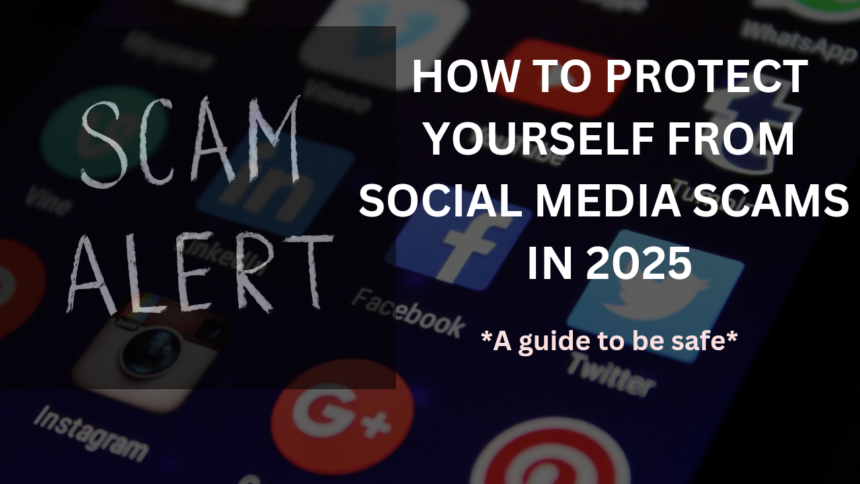In today’s digital era, social media platforms have become indispensable, linking people all over the world and hence increasing social media scams .
However, this interconnectedness has hazards. Social media frauds are on the rise, with hackers employing more complex strategies to defraud naive users.
In 2025, defending oneself from these frauds is more important than ever.
Types of Social media scams
Phishing scams
Phishing is still one of the most popular frauds on social media.
Scammers impersonate reputable institutions, such as friends, corporations, or social media platforms, to deceive users into disclosing personal information, login credentials, or financial information.
For example, a bogus message may state that your account will be terminated until you click on a link to authenticate your identity.

Fake giveaways and contests
Scammers entice people into participating in phony competitions by promising free items, cash prizes, or special discounts.
To collect the reward, customers are typically required to fill out forms containing personal information or pay a “processing fee”.
Impersonation Scams
Cybercriminals construct phony identities mimicking celebrities, businesses, or even friends in order to win confidence and seek money, gift cards, or personal information.
A fraudster purporting to be a buddy and requesting immediate financial assistance.
Job Offer Scams
Fraudulent job offers that promise great salary and flexible working circumstances target job seekers.
These frauds frequently request upfront money for training or access to career resources.
Romance scams
Scammers use dating and relationship sites to acquire their victims’ confidence before seeking money under false pretenses.
Cryptocurrency scams
With the growth of cryptocurrencies, bogus investment schemes on social media offer huge returns for tiny deposits.
Victims are sometimes prompted to transfer money or cryptocurrency to wallets controlled by fraudsters.
Clickbait Scams
Malicious URLs masquerading as breaking news, exciting tales, or startling videos redirect consumers to phishing websites or install malware on their devices.
Why are social media scams increasing in 2025?
Advancement in Technology: Scammers are using artificial intelligence to make deepfake movies, clone voices, and establish convincing fake accounts.
Growing User Base: As the number of social media users increases, fraudsters have a greater pool of prospective victims.
Lack of Awareness: Many consumers are ignorant of the most recent scam strategies, making them easy prey.
Increased Online Transactions: As more individuals shop and do financial transactions online, social media becomes a great target for fraud.
How to protect yourself from social media scams in 2025?

Enhance privacy settings
Review and adjust your social media privacy settings to restrict what others may see.
Avoid disclosing personal information such as your phone number, address, or financial information publicly.
Beware of suspicious links
Avoid clicking on links from unfamiliar sources, even if they appear urgent or appealing.
Hover over the link to ensure its credibility before clicking.
Verify accounts and offers
Always check the legitimacy of profiles and offers.
Official accounts generally have a verified badge, and reputable freebies or contests will not require money.
Enable Two Factor Authentication (2FA)
2FA provides an additional degree of protection to your accounts.
Even if your password has been hacked, this step will prevent unwanted access.
Recognize red flags
Too Good to Be True: Be wary of offerings that guarantee unrealistic benefits or returns.
Urgent Requests: Scammers frequently use a sense of urgency to get victims to act without thinking.
Unsolicited messages: Messages from unknown users should be treated with care.
Educate Yourself About Scams
Stay current on the newest scams and how they operate.
Many platforms constantly notify consumers of typical scam strategies.
Secure Your Accounts
Create strong, unique passwords for each platform and update them on a frequent basis.
Avoid using the same password for numerous accounts.
Avoid sharing financial information
Never disclose your bank information, credit card numbers, or cryptocurrency wallet keys on social media.
Report and block scammers
If you see a questionable profile or behavior, report it to the platform right away and ban the person.
Most platforms have personnel devoted to investigating and resolving frauds.
Be cautious with downloads.
Download files or software published on social media only if they are from verified sources.
Malicious downloads may jeopardize your device’s security.
How platforms are fighting Social media scams?
To prevent frauds, social media networks are putting in place advanced security measures.
Artificial intelligence and machine learning algorithms are being used to detect and ban fraudulent accounts, monitor suspicious activity, and identify phishing links.
Furthermore, platforms are working with cybersecurity groups to educate users and give tools for fraud protection.

What to do if you fall victim to a social media scam?
Act Quickly: If you feel you’ve been duped, take rapid action to limit the harm.
Change Your Passwords: Update your account information and enable two-factor authentication.
Contact Your Bank: If financial information has been leaked, notify your bank or credit card provider so that your accounts can be frozen or fraudulent transactions reversed.
Report the Scam: Make a complaint with the social media network and, if required, notify local law police or cybercrime authorities.
Warn Others: Share your story so that others might notice and avoid similar frauds.
Conclusion
In 2025, social media frauds will evolve, as will the tools and information used to counteract them.
By remaining knowledgeable, attentive, and proactive, you may protect yourself and others from falling victim to these scams.
Social media should be a place of connection and innovation, not a shelter for cybercriminals.
Increase your awareness and make safety a top priority in your online dealings.
Also read: Feuling human progress in the future through technology









